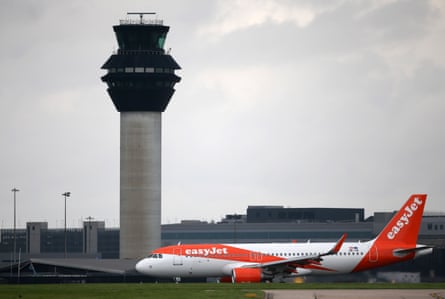
This summer a catalogue of human-made and natural disasters has wreaked havoc with the nation’s travel plans, with last month’s UK air traffic control meltdown – which caused more than 2,000 flights to be axed – the coup de grace.
Last year’s chaos was a hard act to follow after ground staff shortages led to the cancellation of thousands of flights. Yet 2023 obliged and, over the past few months, Britons have experienced cancellations and delays caused by extreme weather at home and abroad as well as strike action in other countries, among other problems.
The holiday season got off to a rocky start when a technical issue forced British Airways to cancel nearly 200 flights going into the late May bank holiday weekend. Then, in June, easyJet cut more than 100 Gatwick flights owing to thunderstorms. Even more of its customers were affected when, in early July, the airline scrapped 1,700 summer flights in a move linked to air traffic control strikes in Europe.
It got worse still. By the end of July, British tourists were trapped in a “living nightmare” after wildfires in Rhodes and parts of southern Europe caused chaos. Tui, Jet2 and easyJet were among the companies to cancel trips.
There have been so many events that have made travel stressful or unpredictablePaul Charles
The final straw was the UK air traffic system failure that affected hundreds of thousands of passengers, including many families on their summer holiday.
While a lot of this has been beyond the control of the airlines, many travellers complain that they are making a difficult situation worse with practices such as overbooking. This is when more seats are sold than there are on the plane, and it is now happening on short hops with budget carriers such as Ryanair.
Paul Charles, the chief executive of the travel consultancy The PC Agency, says: “You’ve had to be quite brave, or lucky, to get through this year’s travel incidents without being affected badly.
“There have been so many events that have made travel stressful or unpredictable … Systems or processes that we have relied on for many years are creaking at the seams in some cases, due to the sheer numbers of people travelling.”
 View image in fullscreenEmpty sun loungers line a beach at a resort in Rhodes, Greece, after wildfires forced many holidaymakers to flee the region. Photograph: Dan Kitwood/Getty Images
View image in fullscreenEmpty sun loungers line a beach at a resort in Rhodes, Greece, after wildfires forced many holidaymakers to flee the region. Photograph: Dan Kitwood/Getty Images
If your travel plans were affected – for example, you were hugely delayed or had to shell out on new flights or pay for additional accommodation or other costs – you are probably poring over the small print of your airline documents and travel insurance policy.
Here we look at what you might be entitled to, and how to get it.
Was your flight delayed or cancelled?
If your flight was delayed or cancelled and you used a UK- or EU-based airline, then you are entitled to compensation. This, however, depends on what caused the disruption. If it wasn’t the airline’s fault – as was the case with the recent air traffic control meltdown – then the bad news is you almost certainly will not be entitled to a payout.
If you are delayed by more than three hours and the airline is to blame, the compensation starts at £220 for a short-haul flight to £520 for long haul.
If your flight was cancelled with less than a fortnight to go, you may also be able to claim compensation based on the timings of the alternative flight. The sum is based on the type of flight, length of delay and notice given, with payouts ranging from £110 to £520.
You should get your money back for all parts of the ticket you have not used. For instance, if you had booked a return flight and the outbound leg was cancelled, you should get the full ticket cost back from your airline.
Can I claw back extra cash spent on replacement flights?
The fallout from cancelled flights is particularly acute for people who book their own flights and accommodation, as Juliet Stott and her family discovered when Jet2 sent them a text cancelling their flight to Sicily and offering a refund six days before they were due to leave. They faced a choice between ditching their summer holiday, though they had already shelled out thousands for accommodation etc, or buying new flights. Until Guardian Money stepped in, they seemed to be struggling to get the extra £1,600 they forked out paid back to them.
 View image in fullscreenJuliet Stott says she was left out of pocket after travel disruption. Photograph: Sarah Banks
View image in fullscreenJuliet Stott says she was left out of pocket after travel disruption. Photograph: Sarah Banks
There will be many others who, now they are back home, are engaged in similar battles – anecdotally, there are lots of horror stories out there. Many airlines are likely to have been inundated with calls, emails and letters from unhappy customers, with some warning of lengthy response times.
Martyn James, the consumer rights campaigner, says airlines are sometimes so focused on whether financial compensation is due that they miss the point about their other legal duties, such as providing alternative flights or accommodation.
He says of the Stott case: “Jet2 should have got them on the next available flight – either with them or with another airline, unless it wasn’t safe to fly for whatever reason. This is usually designated by the Foreign Office website. As such, they should be repaying all reasonable costs due to the fact that they failed to do this. I expect to see loads of these cases after last month’s [air traffic control] debacle.”
‘Denied boarding’ AKA overbooked flights or being ‘bumped’
Sometimes airlines sell more seats than there are on the plane. Usually this happens on the grounds that people do not always turn up but sometimes it is because they have had to use a smaller aircraft.
Being “bumped” from your flight is also called “denied boarding”. If you volunteer, it is up to you and the airline to agree compensation. Often, airlines will offer cash or vouchers at the gate as an incentive. You are also entitled to an alternative flight or a refund.
If it happens without your consent, you are entitled to compensation, as long as you checked in on time. The amount depends on the flight type and the delay, with the compensation framework the same as for cancellations.
Can I get a refund if my holiday was ruined by a weather event?
 View image in fullscreenThe fire-ravaged convent of Santa Maria di Gesù in Palermo. Wildfires triggered by heatwaves devastated parts of Italy this summer. Photograph: Francesco Militello Mirto/EPA
View image in fullscreenThe fire-ravaged convent of Santa Maria di Gesù in Palermo. Wildfires triggered by heatwaves devastated parts of Italy this summer. Photograph: Francesco Militello Mirto/EPA
If your holiday was “curtailed” – to use the official term – you may be able to claim some compensation depending on your contract with the hotel or holiday company.
James says: “Legally we are in tricky territory here, as businesses are not generally responsible for things out of their control, like natural disasters or extreme weather. But they will have contract clauses covering what happens if the hotel or holiday firm cannot provide the service you have paid them to deliver. Under these circumstances, you may be able to get a ‘proportional refund’.”
If you had a two-week package holiday in Rhodes booked and it was cancelled seven days in, you could expect to get a refund for the remaining seven days.
If big changes to your itinerary were required, then the operator must offer an alternative holiday or a refund of the full package price. Generally, a change of more than 12 hours on a 14-night holiday is a significant change.
Where should I start?
Some airlines have a clause in their terms and conditions stating that passengers must submit claims directly, and you can usually find the best way to do this on their website.
You may also be able to claim on your travel insurance but ordinarily it will not cover things an airline is legally required to pay for – such as overnight accommodation. Some policies have a set amount they pay out, minus any excess, for delays over a certain period or cancellations. Your insurance will probably be more useful if you are trying to recover money for lost or damaged baggage and belongings.
Can I claim back the extra money I had to spend to get home?
The rules around compensation for costs incurred as a result of flight cancellations and delays are less clearcut, says James.
A so-called “direct loss” is money lost as a direct result of the situation. For example, having to buy another plane ticket if the airline cannot find you an alternative. Airlines can be real sticklers for paperwork with these claims, even if it is their fault, he says. So keep your boarding card, forms and any evidence related to the claim.
Getting all your money back is by no means guaranteed
Getting all your money back is by no means guaranteed. If the airline feels you have booked an upgraded seat, for example, then it may pro rata a refund depending on the prices at the time.
James regularly hears of people forced to take £100 cabs to get home. “I really do sympathise with people in this situation,” he says. “However, though it’s a ‘direct’ loss in the sense that you’ve had to fork out the cash to get home, the airline is likely to argue that you could have got a train or a bus that was less expensive.”
What to do if your claim is rejected
 View image in fullscreenA technical failure in Britain’s air traffic control system on 28 August caused widespread flight delays and cancellations. Photograph: Adam Vaughan/EPA
View image in fullscreenA technical failure in Britain’s air traffic control system on 28 August caused widespread flight delays and cancellations. Photograph: Adam Vaughan/EPA
From compensation claims to refund requests, there has been a logjam with airline complaints in recent years, largely owing to the Covid pandemic. However, some carriers have been shirking their responsibilities to passengers, with the Civil Aviation Authority (CAA) recently cracking down on Wizz Air for doing this.
If an airline does not resolve your complaint to your satisfaction, escalate it via their alternative dispute resolution body (ADR). They should provide details of the relevant scheme, or use the list on the CAA website to find it.
ADRs are not quite the same as an ombudsman, and feedback from users is often mixed. Nonetheless, they are a way to take your complaint further that does not involve legal action.
If your airline is not in a scheme, try the CAA’s passenger advice and complaints team (Pact). It will consider your case and, if it thinks it is valid, take it up with the business. However, Pact does not have legal powers to impose a solution.
As a last resort, you can take legal action against the airline.


